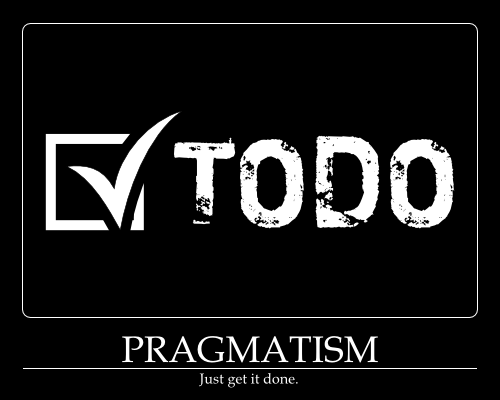Last updated on August 15, 2013
Video Games, Art, and Objective Standards is an exhaustive look at video games, the ambiguities of art, and how they come to rest on objective standards – though maybe not in the way you were thinking. This series intends to show video games are a unique medium that deserves a special criteria and methodological examination. This is part and parcel of my theology as well. I invite you to leave comments on any section below!
- Introduction
- Preliminary Objections (2)
- (Preliminary Assumptions) Defining the Video Game
- Game Studies – Ludology
- Game Studies – Narratology
- Dewey – Understanding the “Live Creature”
- Dewey – Avoiding Abstractions
- Dewey – Video Games as Pragmatic Experiences (2)
- Judging Video Games as “Art” (2) (3)
- Addressing the Critics and Game Studies
- Conclusions
In a way, this is a rejection of the old Cartesian dualism that mind and body are somehow separated. Video games show us by their very nature that this isn’t the case, as both work as equal partners in the process of fixing disunity in a consummative experience. It’s only with internal reflection and bumping into problems that disrupt our daily routines do we even see this division, much like when the hypothalamus continues to monitor heartbeat and breathing even without our direct thought. Life itself is immersive enough, and video games reflect that immersive nature to a set of rules and aesthetic elements.

Given this emphasis on experience, one must reject the nature/spirit dualism that narratology and ludology provide. The former assume that humans view their lives in the fashion of story, while the ludologist attempts to see the underlying principles behind everything. In both cases, each has established a dualism in the video game that simply does not exist. They have merely inherited a methodology using the “apparent” order as a paradigm on which to base their judgement of new forms of media. In fact,
the senses are the organs through which the live creature participates directly in the ongoings of the world around him.
how can the senses exist in isolation from each other in playing a video game when they are necessary for the experience (excepting, for lack of technology, smell and taste)?
The sense organs find their full realization in sense itself, and thus become a necessity. However, interactions between the player and the game are not enough, for interaction must turn into participation; one does not merely play, or create, a game distractedly. Even within a game, past experience and knowledge are integrated into the experience of the present; as a game developer wishes to off er new experiences based on all that has come prior, so the video game player thirsts for new ideas and concepts in these virtual worlds.
However, in this case, natural energies, technically, abstain from the use of actual matter, but recreating matter, and even improbable forms of matter, in virtual worlds; new things in such manufactured realities are simply composites and ideas of the old. In that sense, humankind, through consciousness, employs imagination to regulate, select, and create variety within video games to expand life.
As well, the task restores, in the search for true meaning, the union of sense, need, impulse, and action that has gone missing from compartmentalization of human life. That this art form tends to hearken back to the “savage” and integrate the rapid pace of human technology fuses the past and the present together. It is, in this sense, that humans can make aesthetic communion with the virtual world and re-awaken their communion with the real world, an enhancement of ordinary experience that engenders further imagination.
We can think of this in the Christian life as well. To think rightly, I imagine, must come from thinking Christian. But thinking Christian isn’t an easy task; everyone’s got an opinion and an agenda. We think the way that we think (pardon the repetition) reflects reality, when it really reflects our vision of reality inherited from our forefathers. Confused yet?
To clarify: John Dewey was a pragmatic philosopher, not in the vein of traditional Western philosophic. Contrary to the popular meaning of pragmatism, in that someone does whatever makes the most sense or that they will do anything to reach a certain end, philosophical pragmatism primarily found fame (and later, infamy) through its rejection of the long-held notion that thought actually represents reality. Rather, they saw thought as a tool and a way to interact with the world for the purpose of solving problems. Because of the nature of philosophy in pragmatic philosophy, most subfields in philosophical musings exist solely in terms of their practical use rather then their “world-building” usage.
In a way, this is a much more humble version of philosophy that extricates it from its previously theological roots. And, that is partly the point. Anyone who has ever taken an undergraduate philosophy course can tell you that philosophy deals with the Big Questions, but rarely interacts with our daily lives except in terms of abstract conversations about the nature of reality. It certainly doesn’t describe how I experience it, nor what the “meaning” actually constitutes for how I live. It dictates from on high using a preset metaphysical framework which, for some strange and odd reason, also fits exactly into the way human beings think!

From a Western theological perspective, perhaps, this would make sense. Once you take God out of the machine, however, what remains is a vestige of a bygone era. Once God died in philosophy once Nietzsche found prominence, philosophers had little use for such frameworks…yet continued to search for them and use them! Frankly, that’s the confusing bit about their whole enterprise: they continue to use these abstractions and define life in human thought, rather than by human action.
That’s what makes the grace/works debate so interesting, because it reflects this very same sort of problem. Is Christianity an abstract set of beliefs we can analyze with our mind, as in understanding the concept of grace, or of works, in that we must work for the Lord in true action and not just “faith” or “belief”? Many people share a variety of different opinions on the subject. It explains why Martin Luther, for example, hates James with a passion (he calls it an “epistle of straw”, echoing 1 Corinthians 3:
0 According to the grace of God which was given to me, like a wise master builder I laid a foundation, and another is building on it. But each man must be careful how he builds on it. 11 For no man can lay a foundation other than the one which is laid, which is Jesus Christ. 12 Now if any man builds on the foundation with gold, silver, precious stones, wood, hay, straw, 13 each man’s work will become evident; for the day will show it because it is to be revealed with fire, and the fire itself will test the quality of each man’s work. 14 If any man’s work which he has built on it remains, he will receive a reward. 15 If any man’s work is burned up, he will suffer loss; but he himself will be saved, yet so as through fire.
Luther focused so totally and utterly on the idea of grace that nothing else could restrain it – hence the “sin boldly!” pronouncements. It’s not a surprise to see much of German and Reformed Protestantism follow in that path, especially in Karl Barth’s Christological theology. Many accuse Barth of taking grace so far that it becomes a universalism, denying a reality of judgment for any unbelievers; his response, for the most part, is rather coy in avoiding those claims. Still, James is in the Bible, and we cannot avoid it when James 1 says:
23 For if anyone is a hearer of the word and not a doer, he is like a man who looks at his natural face in a mirror; 24 for once he has looked at himself and gone away, he has immediately forgotten what kind of person he was. 25 But one who looks intently at the perfect law, the law of liberty, and abides by it, not having become a forgetful hearer but an effectual doer, this man will be blessed in what he does.
Is mere faith or mere works alone sufficient in themselves? Considering we could make a case for either, putting one on a pedestal unto itself introduces a similar Cartesian dualism into the text. Both contribute to the overall thinking and doing of the Gospel, and taking one in exclusion to the other introduces the various theological controversies had throughout time. In faith, theology requires an even hand, not an agenda tacked on to authoritative credential or “Biblical authority” without even the slightest whiff of it.
In other words, we need to avoid abstractions. They remove vitality, life, and imagination from the world, and certainly from video games as well.
